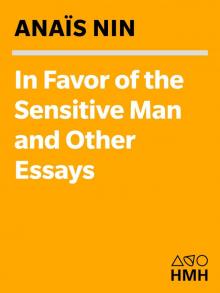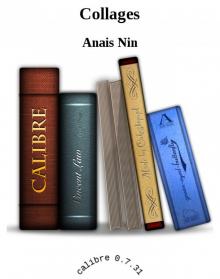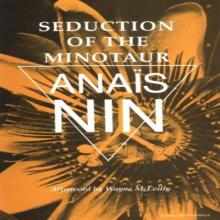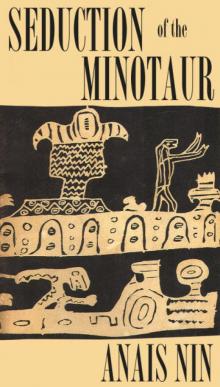Seduction of the Minotaur Read online
Page 13
She had loved in Sabina an unborn Lillian. By adding herself to Sabina she would become a more potent woman. In the presence of Sabina she existed more vividly. She chose a body she could love (being critical of her own), a freedom she could obey (which she could never possess), a face she could worship (not being pleased with her own). She believed love quite capable of such metamorphosis.
These feelings had been obscure, unformulated until the night the three of them had gone out together and Sabina had drunk a whole bottle of Pernod. She had become violently ill. Jay and Lillian had nursed her. Sabina was almost delirious. She was easily prone to fever and Lillian was alarmed by the way her face seemed to be consumed from within. She stretched out beside her to watch over her and Jay had gone to sleep in the studio.
In the first version of that night, gathered from Sabina’s smoky talk and Lillian’s evasions. Jay had believed that jealousy of him had sprung between them and separated them. But this was only on the surface. Later Lillian saw another drama.
Both Sabina and Lillian, faced with a woman, realized they felt closeness but not desire. They had kissed, and that was all.
Sabina wanted something of Lillian: her inexperience, her newness, as if she wanted to begin her own life anew. They both wanted intangible things. Impossible to explain to Jay who made everything so simple, and reduced to acts. He could not understand atmosphere, moods, mysteries.
The true bridge of fascination was the recognition that in Sabina lay a dormant Lillian. A Lillian Jay had not been able to awaken, a liberated Lillian. For he had needed the devoted Lillian.
Sabina was a drought of freedom. Every gesture she made, every word she uttered. She was free of faithfulness, loyalty, gratitude, devotion, duties, responsibilities, guilts. Even the roles she played were chosen by herself.
Faced with the culmination of their fantasies of a possible closeness to woman, neither one wanted to go further. They both realized the comedy of their pretenses. Something so absurd in their bravado towards all experience, in their arrogance about playing Jay’s role. They could not escape their femininity, their woman’s role, no matter how difficult or complex.
The story which had filtered out had become wrapped in poetry, myth, and drama. It became more and more difficult to reveal the truth, for it was so much more simple, so much more human. Lillian kept the secret because she felt it would make Jay love Sabina more. Jay thought Sabina loved women and that this would explain her water-tight compartments.
What would Jay have thought of their hesitations, awkwardnesses, their own bewilderment. He might have laughed at them. They had both played roles: Sabina in a theatrical way, with capes, make up, late arrivals, dramatic effects, disappearances, mysteries; Lillian the one dictated by her outward appearance of naturalness and honesty. “From you I expect honesty,” said Jay. Everyone knew Sabina was an actress. Everyone believed Lillian sincere.
Lillian loved Sabina’s fluidity, because she wanted it for herself. When she thought she was courting a woman, she was courting Sabina’s gift for escape from whatever interrupted the course of passion, whatever interfered with life as an adventure.
They kissed once. It was soft and lovely, but like touching your own flesh. All this was on the edge of their bodies, not at the core. Sabina was touched to see Lillian’s bedazzlement. She smiled a triumphant smile.
Lillian had imagined that by loving Sabina a miraculous alchemy would take place. What took place that night was not love of woman. It was a hope of an exchange of selves.
It was Sabina’s feelings Jay was curious about.
But there were so many things Lillian could not tell Jay. So many things he did not want to hear. Jay thought he could arrive at a dissolution of Sabina’s potency by an acid bath of truth. He was seeking to exorcise her power.
He would never believe that they had contemplated allying themselves because they felt incomplete and exposed and less strong than he imagined them. Jay was tone deaf to such secret weaknesses, needs, moments of helplessness.
He would not believe that they both wanted to be consoled as by a sister, or a mother, for his erratic behavior, his multitude of treacheries.
Antiphonal music of desires at cross currents repeated to infinity. Jay the gate-crasher seeking a truth too black and white. And the key lay in prefabricated myths which appeared in dreams with veiled faces, mute, undecipherable.
Until Djuna took up each strand, delicately separating each one from pain and blindness, the pain of blindness. Strange how in this light, high above the earth, flying through the regions of awareness which Djuna had taken her into by a method of ascension she had finally learned from her. Djuna’s words, Djuna the aviator of language, air force for grounded lives.
For awhile Lillian had been devoted to both Jay and Sabina. And what had Jay wanted? To own them both? She remembered his letter to her: “You are really strong. I warn you. I am no angel. I am insatiable. I will ask the impossible of you. What it is I don’t know.”
And a few years later he demanded of her that she understand the presence of Sabina at first only in his paintings…and then later in their lives. He even wanted Lillian to help him know Sabina.
Just before she left Paris for the last time, abdicating, Lillian said to Jay: “Now the time has come for me to tell you of the Sabina I know, because it will make you love her more. You see, what I was given to see was a glimpse of Sabina’s innocence. That night…we had both dreamed of escaping from our bodies, our molds. At a certain stage of exaltation all the boundaries are lost, identity too. Sabina was awkward too; she did not know how to behave before a woman. She kept repeating: ‘I’d like to be at the beginning of everything, when I could believe, I’d like to be at the beginning of all experience, as you are, able to give yourself, trusting.’ She wanted my innocence, and what we want is what we are. And I…all my life I could hardly live or breathe for fear of hurting anyone, I had seen Sabina take what she wanted and being loved for it. And I wanted to catch from her by contagion that irresponsibility. Now you will love her more.”
“No,” said Jay, “much less. Because she would never tell me what you have told me. What you describe—I could not hate that. There’s some beauty to it. I have just realized that what I gave you was something coarse and plain compared with that.”
“No, Jay, you made me a woman. Sabina would have thrust me back into being a half woman, as I was before I met you.”
“Beyond the love,” said Jay, “we were friends. Sabina and I will never be friends. I hate her unnecessary complications.”
“But they interest you. They are your drugs. I could not give you that. It is I who gave you something plain. I am not a drug.”
She looked at the grey blond hair on the nape of his neck, and felt almost capable of staying at his side while he experienced his passion for Sabina. But she was too certain that the body of Sabina would triumph. They were better matched in violence. But what would become of the tender Jay she had known?
So she said: “I must go and see my children. Adele is ill.”
“Whatever you do is right. For the first time I see some beauty in it.”
The plane was flying into the night now. At times it shivered as from too great an effort to gain altitude.
Jay had been concerned with being the lover of the world, naming all it contained, caressing it with his short and stocky hands, appropriating it, exploring it. And Djuna concerned only with the longitude and latitude and altitude of human beings in relation to each other.
For a while it seemed as if Lillian were flying into a storm. Luminous signs informed her she must strap herself to her chair. Other passengers slept, confident that strapped to their chairs they would safely reach earth again. Lillian slid the curtain open and through the porthole watched the immensity of space in which sorrows seemed to lose their weight. She looked at the moon, as if to communicate with it, as if it would assure her that the storms of earth could not reach her. Looking at the moon intently it
seemed to her that the plane flew more steadily.
It was the year when everyone’s attention was focused on the moon. “The first terrestrial body to be explored will undoubtedly be the moon.” Yet how little we know about human beings, thought Lillian. All the telescopes are focused on the distant. No one is willing to turn his vision inward.
What she had seen of Larry during their marriage was only what he allowed her to see, giant albatross wings, the wings of his goodness. She had been unable to see above or beyond the rim of them. Larry had collaborated in this. He only offered his goodness. He never said: “I want, I like, I take,” but “What do you want? What do you like?” He deliberately obscured any vision into his being.
“The moon is the earth’s nearest neighbor.”
They had slept side by side. In the night, or at dawn, his body had been there. She had felt its radiations. In his voice there were caresses. In his sympathy, a tropical balm. In his goodness, a universe. His attentiveness blinded her. If he had another life, other selves, he turned like a planet, only one face towards Lillian.
“A rocket that would take months to reach one of the planets can travel to the moon in a day or two.”
“An instrument station on the moon could communicate with the earth with greater ease than one on Mars or Venus.” It was not necessary to circumnavigate around Larry or go to Paris, to Mexico. At last she was a receptor for Larry’s messages!
“To investigators preoccupied with the remarkable developments in contemporary astronomy and physics the moon had seemed a dead and changeless world.”
But only because she had not looked beyond the mask. The rim of density around Larry had been his goodness. It was selfless, almost anonymous. He was present only when summoned, and summoned only by distress. Lillian had fixed the distorted image, but Larry had contributed the mask.
“The moon is an astronomical stone. Because its surface has preserved the record of ancient events, it holds the key to the solar system.”
The key to the marriage? Larry had achieved changelessness.
Whereas Lillian was created “out of the air and water that support life on earth which continuously wear away the surface of our planets. Processes in the interior of the earth heave up chains of mountains for demolition by the forces of erosion, and the cycles of building and erosion from one epoch to the next erase the records of the past.” That was a portrait of Lillian’s turbulences in planetary terms! And of Larry’s conservation of the past, of their life together.
“The moon, on the other hand, has neither atmosphere nor oceans, and has never been eroded by wind and water. Furthermore, the circular formations that dominate the moon’s topography indicate that its crust has never undergone the violent changes which are involved in mountain-building processes on earth. “
Larry had sought to present such an undisturbed surface to Lillian’s investigations. But this evenness had been as much a mask as Sabina’s more theatrical disguises. What do you feel? Where are you? Will you share my enthusiasms? My friendships?
What had sent Larry so far away from human life into the position of a spectator, so far away from earth? What had made him wrap himself in an unbreathable atmosphere of selflessness and then be absent from his own body? There were incidents she knew. But she had never coordinated them. She was landing for the first time on this new planet, Larry. “In any case, a planet would be cool at birth.” His mother had not wanted him to be born. This was the first denial. He had arrived unsummoned by love and jealously resented by his father.
“A cool birth does not exclude the later heating and melting of planetary bodies by radioactive elements they contain.”
The child, inhibited by such “a cool birth,” sought warmth by running away from home to the huts of the Negroes living and working nearby for his father. His father was drilling oil wells in Brazil for an American firm.
His pale mother had faded blue eyes, and wore white dresses which covered her neck and arms, and on which the sewing machine, as if in fear the material would undulate, swell, or fly off like a parachute, had criss-crossed a thousand stitches, tight and overlapping, controlling every inch in a stifling design called “shirring.”
The father believed in unremitting work, and no idleness or dreaming. He clocked the universe, constantly pulling out his watch like a judge at a running match. His mother was beset with fear. Every pleasure was dangerous. Swimming led to drowning, fireworks could blow your finger off, hunting fireflies could anger a rattlesnake, associating with native children would turn you into a “savage.”
Larry ran to the Negro huts for warmth of voices, warmth of gestures, and warmth of food. He liked the half-nakedness, the soft laughter. Home here seemed like a nest, with joyous flesh proximity. Caresses were lavish. There was a hum of content, a hiss of doves. Violence came and went like tropical storms, leaving no traces. (At home a quarrel led to weeks of silence and resentment.) It was Larry’s first closeness to human beings. He threw off his too tight clothes. The Negro mother was his nurse. She smiled upon his fairness. Her flowered cotton dress smelled of spices, and she moved as easily as cotton tree seeds. When she was happy her body undulated with laughter. Their laundry, swollen like sail boats, was more vivid than a rainbow.
Yet she betrayed him.
He had played with the naked dark children. After swimming in all the forbidden lagoons and rivers, they had openly admired each other, half mocking, half tender. In his own home Larry had wanted to repeat these games with his younger brother. But it was not a swimming adventure as it was out in the country, among plants and grass and reeds. It was in the bathroom. Larry thought all discoveries of bodies could be made as merrily as by the riverside. His younger brother was so delicate, his hair so fragile, his skin like a girl’s. With delight they contrasted skin tones, breadth of chest, length of legs, strength of legs. But this scientific erotic exploration was watched by the nurse through the transom window, and the same thing she laughed at in nature, she now reported like a policeman on the frontier of some forbidden land.
A shocking treachery from the world he loved with a trusting passion, a treachery which came not from where he might have expected it, the shaggy-browed father with his eyes too deeply set in tired flesh, or from the cool eyes of the pale mother, but from the spice-scented, barefooted, tender handed black mother he loved. Such treacheries throw human beings into outer space, at a safe distance from human beings. They are propelled into space by attacks from the human species. Could not the nurse have laughed at the children exploring the wonders of the body? Could she not have laughed at their games as she laughed at their games while swimming? Did she not herself keep her warm dry hand on his coltish shoulder blades and comb his hair with her fingers “To feel the silk of it”? He had almost reached the earth with her, with her he had almost been born fully to his molten life.
The child has set his planet’s course, has chosen his place in outer space, according to the waves of hostility or fear he has encountered. Pain was the instrument which set him afloat and determined his course. The sun, whether gold, white, or black, having failed him, he will exist henceforward in a more temperate zone, twilit ones, less exposed to danger.
Lillian had at first misinterpreted his silences. He communicated only with children, and with animals. His absences (if only I knew where he was when he was gone) distressed her. Never knowing until later that, as a measure of safety he had sought periphery, the region of no-pain, where human beings could not reach him.
The first betrayal had thrust him into space to rotate at a certain distance from the source and origin of the first collision.
Lillian calculated the effect of his not having been wanted. The effect of adopting a family and then being betrayed. The atmosphere of gaiety and freedom was altered. When the Negro shack was accidentally destroyed by fire he had no regrets. When he was made to sail away from the Brazilian planet to England, he was sullen. The parents had decided he could not grow up into a nativ
e “savage.” He needed discipline. Larry already preferred drumming to sixteenth-century English songs. He liked the stamping of bare feet more than the waltzing of high heels and patent leather shoes. He liked vivid pinks, not his mother’s colorless dresses. He liked time for dreaming, not his father’s tightly filled days.
He entered a cold atmosphere of discipline and puritanism. His mother’s sister held the watch now, and also a whip. Every infraction was severely punished. The long walk to school was timed. The purchase of a water pistol was a crime. Pulling a little girl’s hair or pushing her down on the grass was a crime. And as for the mystery of where her legs started and asking if inside the bouffant dress there was a corolla as in the heart of a poppy… Whatever food she served had no taste, because she imposed it. She measured and enforced time and appetite, just as she commanded the flowers to bloom at a certain date.
Larry disappeared behind a façade of obedience. There was a Sea of Tranquility on the moon. Larry lived there. There were no ruffles on the surface. Outwardly he conformed until his marriage to Lillian. Lillian having spent her childhood in Mexico, seemed to be a messenger from the happier days of Brazil.

 Diary of Anais Nin, Volume 5
Diary of Anais Nin, Volume 5 A Spy in the House of Love
A Spy in the House of Love In Favor of the Sensitive Man and Other Essays (Original Harvest Book; Hb333)
In Favor of the Sensitive Man and Other Essays (Original Harvest Book; Hb333) Collages
Collages Seduction of the Minotaur
Seduction of the Minotaur Children of the Albatross
Children of the Albatross Delta of Venus
Delta of Venus The Four-Chambered Heart coti-3
The Four-Chambered Heart coti-3 Diary of Anais Nin, Volume 2
Diary of Anais Nin, Volume 2 Diary of Anais Nin, Volume 1
Diary of Anais Nin, Volume 1 Diary of Anais Nin, Volume 4
Diary of Anais Nin, Volume 4 The Winter of Artifice
The Winter of Artifice Seduction of the Minotaur coti-5
Seduction of the Minotaur coti-5 Children of the Albatross coti-2
Children of the Albatross coti-2 Henry and June: From A Journal of Love -The Unexpurgated Diary of Anaïs Nin (1931-1932)
Henry and June: From A Journal of Love -The Unexpurgated Diary of Anaïs Nin (1931-1932) Ladders to Fire
Ladders to Fire House of Incest
House of Incest